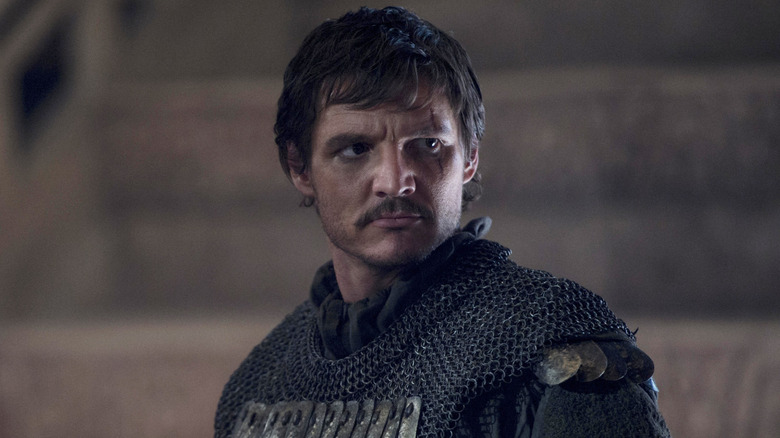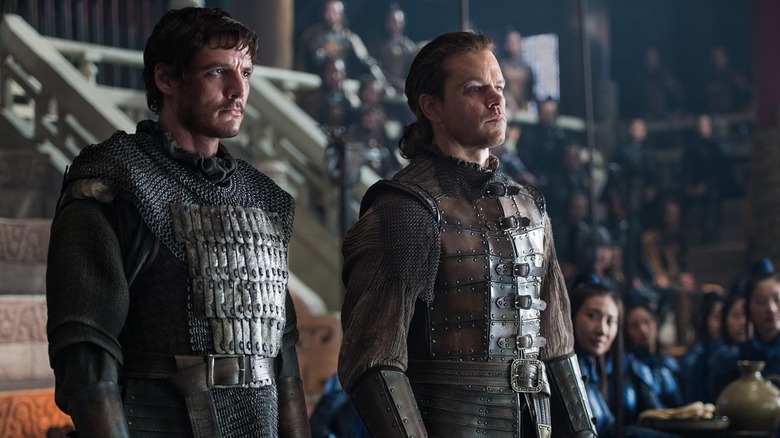Pedro Pascal Appeared In One Of Matt Damon's Biggest Flops Before His Rise To Fame
Back when Hollywood was trying to tap into the Chinese theatrical market (before COVID-19 and the Trump tariffs changed everything), the results were ... well, about as inelegant as you'd imagine. Sometimes, to be fair, studios did find organic ways of pandering to the Middle Kingdom, like when "The Meg" included several lead Chinese characters (making the titular shark's third-act attack on Sanya Bay feel a tad less random). Meanwhile, on the opposing end of the spectrum, there's "Iron Man 3," which featured a cameo by seasoned Chinese actor Wang Xueqi for no apparent reason ... unless you happened to be watching the extended Chinese cut of the film.
It was this particular environment that Pedro Pascal found himself entering on the heels of his breakout turn as everyone's favorite horny Dornish hot-head, Oberyn Martell, on "Game of Thrones." For his first venture into the world of tentpoles, Pascal elected to go with 2017's "The Great Wall," a joint China/U.S. production that had Matt Damon starring and revered Chinese filmmaker Zhang Yimou ("Raise the Red Lantern," "Hero") making his English-language directing debut based on a story and script credited to the likes of Tony Gilroy (then best known for his writing on Damon's "Bourne" movies) and "World War Z" author Max Brooks. With a premise that involved other-worldly creatures invading ancient China, the whole enterprise seemed like the kind of original, imaginative East-meets-West blockbuster that Hollywood and China should've been making all along.
Or did it? Since the movie's marketing focused heavily on the sight of Damon with a ponytail saving the people of China from aliens, folks grew understandably worried this was merely an excuse for Hollywood to shove more white savior nonsense down our throats. (As obvious as it might seem in 2025, the whole situation also opened a lot of people's eyes to the fact that Asian audiences have a very different relationship with representation in media than Asian-American moviegoers do.) Indeed, seeing as the film has been generally forgotten since flopping in theaters, "The Great Wall" probably still comes across as white colonialist myth-making to newcomers from the outside looking in.
But in truth? It's much weirder than that.
The Great Wall is pro-China propaganda disguised as a Hollywood tentpole
From the moment we meet them, it's obvious Damon and Pascal's characters in "The Great Wall" — a pair of cutthroat European mercenaries scouring China in the hopes of getting their mitts on some lucrative gun powder — aren't the heroes of this story. Not only that, but every other Westerner who shows up in the film (namely, an Englishman played by Willem Dafoe) is portrayed as being equally selfish and uninterested in helping anyone but themselves, even after finding out about that whole "monsters from outer space attacking China" thing (i.e. the reason a highly specialized order of Chinese warriors has been formed to guard the country's Great Wall).
The movie's Chinese leads, on the other hand, are depicted as unwaveringly selfless, to the degree that it becomes impossible for Damon's soldier of fortune not to admire them and eventually come around to their way of thinking. In the end, "The Great Wall" is less nationalistic than Zhang's controversial spy thriller "Cliff Walkers" (merely championing Eastern collectivism over Western individualism), but it's unmistakably propaganda all the same. In context, though, it's likely the film's U.S. backer, Legendary Pictures, saw this as a surefire way to appeal to Chinese audiences while also using Damon as a carrot to dangle in front of the noses of those stateside.
Of course, "The Great Wall" being pro-China propaganda doesn't inherently mean it's devoid of artistic merit. (Goodness knows we Americans are the last people who should be going around wagging our fingers at other countries for making blatantly jingoistic entertainment.) No, the issues with the film are much more fundamental than that; namely, its plot and characters are uninvolving and flat, while the bold colors, hot emotions, and dazzling action Zhang's wuxia epics are known for have been replaced here with murkier, sexless, smash-and-bang spectacle (save for the climax, which makes fun use of historic hot air balloons). It's no wonder the film was tepidly received the world over on its way to losing an estimated $75 million (per Deadline).
Pascal, however, acquits himself nicely, portraying his character as a charming scoundrel who, frankly, is still much more interesting than Damon's reformed antihero by the end of the movie. Even when the film fell flat on its face, it was obvious he was going places.

